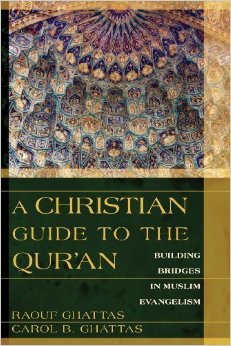In the world we live in, it can be difficult to find information that you can trust. It’s hard to know who to believe, and even many authors have their own agendas. With that in mind, I wanted to offer readers of this blog some suggestions for books that I found in-depth but not overly scholarly, helpful but not condescending, and innovative but not erring. One such book is “A Christians Guide to the Qur’an” by Raouf and Carol Ghattas.
 Subtitled “Building Bridges in Muslim Evangelism,” Raouf and Carol Ghattas take a detailed walk through the entire Qur’an. At each stage, they stop to highlight key verses that can be used as areas to further discussions between Christians and Muslims. For the most part, the comments on each surah of the Qur’an are geared to help Christians know how to build bridges with Muslims. This is done by suggesting what part of the Bible shares more information about the content within the Qur’an. In nearly every case, the Qur’an will briefly touch on a historical account, but most of the details of the encounter are missing. By returning to the Biblical account, much more detail can be brought to bear on the topic under discussion. The idea is that by taking this approach, Muslims are exposed to Biblical narrative in a positive and acceptable manner.
Subtitled “Building Bridges in Muslim Evangelism,” Raouf and Carol Ghattas take a detailed walk through the entire Qur’an. At each stage, they stop to highlight key verses that can be used as areas to further discussions between Christians and Muslims. For the most part, the comments on each surah of the Qur’an are geared to help Christians know how to build bridges with Muslims. This is done by suggesting what part of the Bible shares more information about the content within the Qur’an. In nearly every case, the Qur’an will briefly touch on a historical account, but most of the details of the encounter are missing. By returning to the Biblical account, much more detail can be brought to bear on the topic under discussion. The idea is that by taking this approach, Muslims are exposed to Biblical narrative in a positive and acceptable manner.
While the primary vehicle of conversation is providing more information from Biblical accounts when compared to the Qur’an, the authors do note other items, such as contradictions within the Qur’an as well as places where the Qur’an teaches something opposite to that of Christianity. Of course for me, it is these highlighted areas of difference that I found most interesting. The authors are very respectful in the way these discrepancies are presented. They mention what the Qur’an says, refer to what the Bible says, and then just comment regarding how the two are at odds with each other. For those areas where the Qur’an contradicts itself, the authors just note the other Qur’anic passage and what was said. They do not advocate using such information to beat Muslims over the head with polemic arguments. Rather, the authors suggest a gentler approach of asking questions that will cause Muslims to think for themselves, thus questioning their own beliefs.
As far as content, I found the book very accurate and informative. The authors do a systematic job of analyzing the Qur’an surah by surah paying particular attention to Islamic commentators in order to present a fair and balanced approach to interpretation. Not once did I find a place where I disagreed with the factual content of the information presented.
In general, the book was helpful, thoughtful, and insightful. I did have a few minor issues with the book. One was that often the comments were repetitive. This isn’t always the fault of the authors, since the Qur’an itself is repetitive, so often there is nothing new to add when approaching a new surah. In this respect, the authors are bound to the format of the Qur’an when presenting material about responses. Another aspect of the book I found that could have been better was more focus on the significance of the theological differences between Islam and Christianity. However, I understand that this was not the authors’ focus nor intent. The main point of the book was to help Christians understand what is in the Qur’an so as to have more informed conversations with our Muslim friends and neighbors. Focusing too much on theological differences could have created a confrontational air, which the authors wanted to avoid.
I would recommend this book to someone who only knew a little about Islam and wanted to get a better handle on what is in the Qur’an. The book is both a quick read as well as a great reference. The material is systematically organized, factually accurate, and useful for helping people have fruitful conversations with Muslims.

Robert; I just stumbled across your blog. I’ve been saved 34 years (now 57) and have an M.Div. I’m drawn to understanding Islam because frankly I now believe it is a revived Caliphate the end-time will see not a revived Roman Empire. Have you done any research in this area – what have your thoughts been?
thanks, Jim
Welcome aboard Jim.
Thanks for reading. I too have cast the revived Roman Empire theory aside. If you are interested in the revived Islamic caliphate theory, I suggest reading “Antichrist – Islam’s Awaited Messiah” by Joel Richardson. The book does a great job of juxtaposing Islamic prophetic literature next to Biblical passages. It’s eye-opening.
I do have some more prophetic articles planned along the lines you mentioned, but not for several months yet.
-Bob